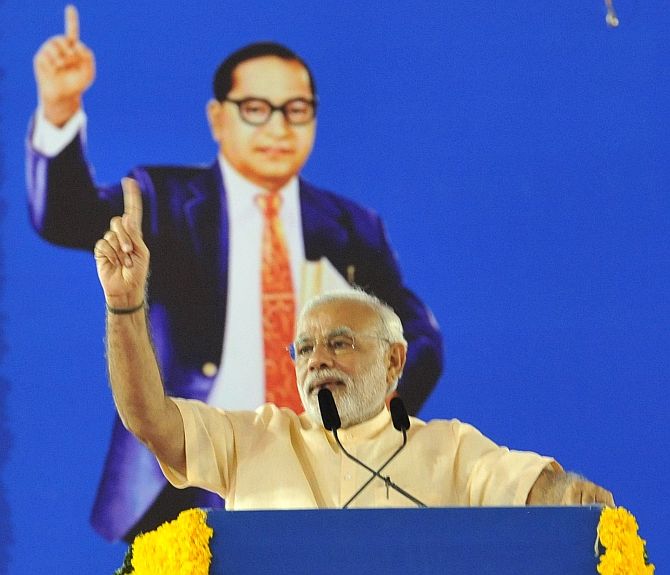'Sooner or later Modi will be forced to look at the broad cultural thrust of Hindutva and assess whether it is helping his development agenda and the image of India,' says Aakar Patel.
In the 60 years between 1927 and 1986, only seven cases of blasphemy were registered in undivided India and Pakistan. In the 30 years since, over 1,000 cases have been registered in Pakistan alone. Why? We will look at that later, but first let's look at something slightly different.
How should the prime minister react to the spate of artists returning their awards?
He has spoken, of course, on the event that led to the artists' reaction -- the killing of a man in Uttar Pradesh over the issue of beef -- and said that it was sad and unfortunate. But he has so far ignored the rebellion of the artists, and it could be said that this silence is not unreasonable. He does not have to react to everything that is happening and I accept that.
The other thing is that many feel that the artists are being hypocritical, that they did not do this in the past when there was violence under the Congress.
A third point is that they did not receive their award from the government, but from the literary academy, which is, or is supposed to be, independent of the government's ideology. Returning it, in that case, is a gesture of defiance not against the State, but against the academy and that was not the intent of the artists.
My view on this is that the gesture of returning awards is theatrical. It is deliberately intended to be. An Indian writer does not have many tools available to protest. Literature and painting are both powerful means of communication, but their impact is not immediate. And writing in protest also assumes cultures and societies where people read and get most of their information through the written word.
The Russian writers of the 19th century told their nation what it was and what they thought of it through their novels. India is not such a place, and television and video have ensured that it will never be such a place.
If it were we would have the writers retiring to their studies and producing works of protest and deep meaning. Instead they are queueing up (there are now 20 or more of them) to tell the government that they are so displeased with its action or inaction that they are rejecting any honour given to them by society. This aspect is the key here.
The writer is protesting against what the government is doing in society. It is the change that they think they are seeing in the society that they write about and paint about that they are disturbed by.
Even if we are to accept that some of them are doing this because of their dislike of the Bharatiya Janata Party and its ideology, it cannot be denied that many of them, and many of us, feel a deep unease about the atmosphere that prevails in India.
And so it becomes difficult, then, to see the artists' actions are just a stunt or motivated by some political cause. Understood in this way, the pressure on Modi to react to the writers' silent demand -- that he step in to calm the Hindutva supporters -- now becomes something serious.
The good thing for Modi is that many in the media, like India's most powerful television anchor Arnab Goswami, think returning awards is a publicity stunt and the story is not as one-sided as it would be in Europe or more civilised parts of the world.
For now, there is some damage to India in the outside world because of Modi's silence. I was interviewed by the BBC in London on this issue a couple of days ago because they thought something had changed in India since the BJP came to power. I did not think it had in any great sense, and it is hardly new in this part of the world for people to be lynched over something or the other.
But the perception is that things are getting worse. and it is this perception that Modi needs to address and see whether it needs his intervention.
One thing to be understood about Modi's style is that he has always been reticent to offer comment on such instances where Hinduvta is seen as responsible for violence. In Gujarat over the decade that he led it, he ignored questions about this and there is a telling interview.
Like all stories in India, this one will also pass and Modi might be rightly assuming that he can sit it out.
To return to that fact we looked at in the beginning. What changed in Pakistan in 1986 is that blasphemy was made punishable by death. This produced a change in society and made people less tolerant, and suddenly the number of cases shot up.
India under the BJP is playing with fire on the law on cow slaughter. We should see the violence consequently produced in society as coming from the same sort of impulse as in Pakistan.
Whether or not he addresses the issue of the artists, sooner or later Modi will be forced to look at the broad cultural thrust of Hindutva and assess whether it is helping his development agenda and the image of India.
Aakar Patel is Executive Director, Amnesty International India. The views expressed here are personal.










